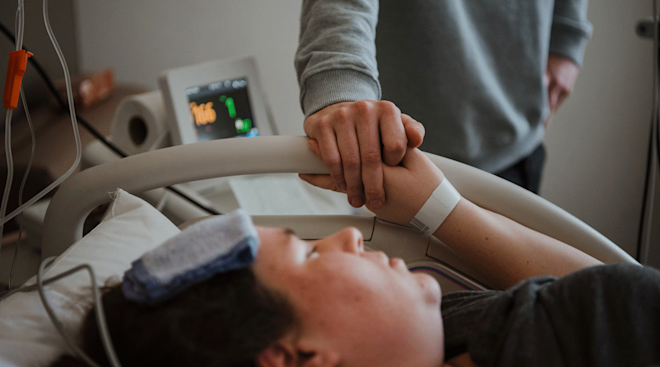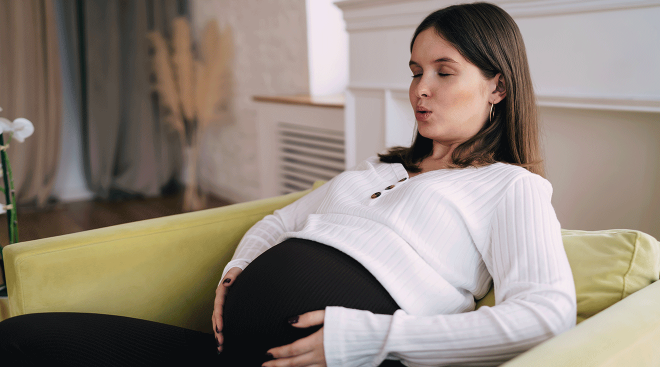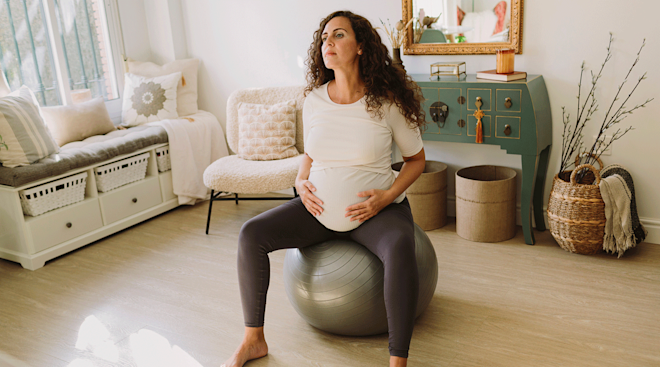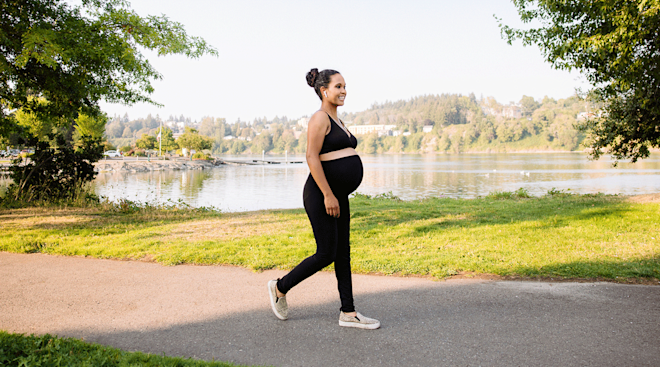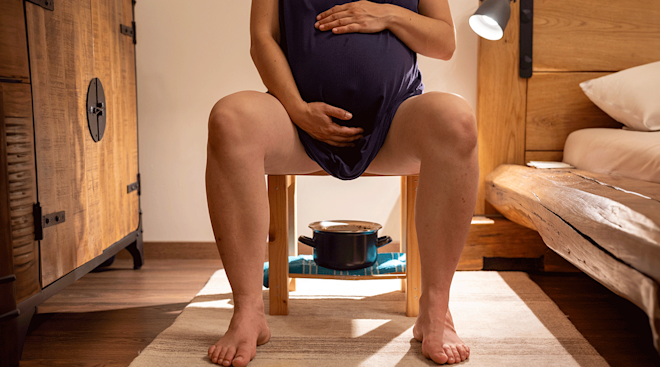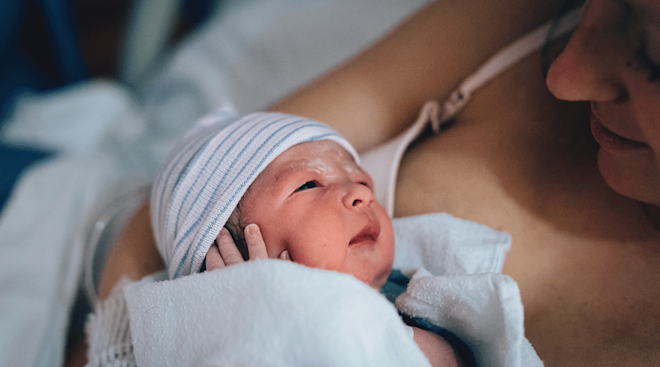Is It Safe to Induce Labor With Evening Primrose Oil?
There’s a reason they call it “going into labor” when it’s time for baby’s big debut: It’s hard work delivering a human! And by the time you finally reach the end of pregnancy, you’re already exhausted—you certainly don’t need a marathon of contractions and pushing.
With the hardest part of pregnancy still looming ahead, it makes sense that you might start asking around for (or, let’s be honest, Googling) ways to make delivery easier. If you do, there’s a good chance you’ll see evening primrose oil recommended as a way to shorten the amount of time you spend laboring or even kick labor into gear.
But is evening primrose oil safe as a means of DIY labor induction? Here’s what the experts have to say about using evening primrose oil during pregnancy.
Evening primrose oil, or Oenothera biennis, is a plant found on many continents, including North and South America. It has a long history of medicinal use in certain cultures, thanks in part to its seeds, which contain several types of polyunsaturated fats known as omega-6 fatty acids.
Some people use evening primrose oil supplements to treat arthritis symptoms, premenstrual symptoms (PMS) and atopic dermatitis. While it’s generally considered safe for most people to take short-term, research doesn’t support its use as a treatment for any condition, says Mayo Clinic.
According to Lauren Manaker, MS, RDN, a fertility-focused dietitian and author of The First-Time Mom’s Pregnancy Cookbook, evening primrose oil is often used for a variety of health benefits, but its safety during pregnancy is still up for debate. While some people believe it can help ripen the cervix and prepare it for labor, there’s not enough scientific evidence to fully substantiate these claims.
Lori Anderson, CNM, a certified nurse-midwife at University of Missouri Health Care, says that some research suggests that evening primrose oil during pregnancy is generally safe and has either no noticeable effect on labor or a very minor one.
For example, a 2019 study suggests that a vaginal suppository of evening primrose oil could improve your Bishop score, aka the measure of how ready your cervix is for labor. Another study from 2022 echoes those same findings, reporting no adverse effects with vaginal administration right before inducing labor.
At the same time, Anderson warns, some older studies—like one from 1999—have raised red flags about using evening primrose oil during pregnancy, finding that it could actually negatively impact labor outcomes, increasing the risk for prolonged rupture of membranes and the need for oxytocin to speed up contractions, among other complications.
Most pregnant people who choose to use evening primrose oil consider it after 37 weeks of pregnancy, says Anderson.
There’s no consensus on whether evening primrose oil can actually induce labor, although some research is promising. Alyssa Dweck, MD, ob-gyn and medical advisor for Intimina, points to a 2023 review of studies that not only finds improvement of Bishop scores with oral or vaginal use of evening primrose oil, but potentially other benefits as well: less time spent in the “pushing” stage of labor and an increase in the Apgar score of newborns.
However, Dweck also notes the authors of this review clearly state that additional, high-quality clinical trials are needed, especially with regard to the safety of using evening primrose oil for inducing labor.
Is it safe to use evening primrose oil to try to induce labor?
Since we’re on the topic of safety, is it considered safe to use evening primrose oil for speeding up labor? Unfortunately, we just don’t have the full picture. Again, some small studies suggest it’s safe, but others have found the opposite to be true, linking evening primrose oil to complications during labor.
And some studies list nausea and vomiting as a potential side effect, as well as the presence of meconium in the amniotic fluid at delivery.
The main purported benefit of using evening primrose oil during pregnancy is preparing the cervix for delivery, or what’s called “ripening” the cervix. According to the American College of Obstetricians and Gynecologists (ACOG), a ripe cervix means the cervix is soft rather than firm, thinned out and partially opened up or dilated.
Although it hasn’t been proven that evening primrose oil can ripen the cervix, some experts think the omega-6 fatty acids contained in the seeds—specifically the active ingredient gamma-linolenic acid (GLA)—can work as a natural labor inducer. According to Anderson, GLA may be able to stimulate the body to produce hormone-like chemicals called prostaglandins, which in turn ripen the cervix and trigger you to go into labor. In theory, evening primrose oil could also be used to reduce the need for medical induction of labor, says Anderson, if a pregnant person has gone past their due date.
The evidence is a bit stronger for using evening primrose oil vaginally versus orally, notes Anderson, although evidence is still fairly weak either way. “Although there are randomized trials on this topic, they’re all fairly small, and so we can’t rule out that there might be other adverse effects related to using [evening primrose oil] to ripen the cervix,” she explains.
It’s also possible to use evening primrose oil during pregnancy in other ways, says Manaker, such as alleviating common pregnancy discomforts like breast pain and mood swings. But Manaker stresses that the scientific evidence is missing for those purposes too, and the use of evening primrose oil during pregnancy should always be under the guidance of a medical professional.
Again, the biggest concern with evening primrose oil use during pregnancy is the potential for labor and delivery complications, like the risk for ruptured membranes and the need for oxytocin to speed up contractions.
Manaker says there are also concerns it could cause excessive bleeding during delivery, especially in people taking blood-thinning medications. Dweck adds that other potential side effects include headache and gastrointestinal upset.
Finally, there’s the issue of herbal supplements in general: Anderson says that because they aren’t regulated by the US Food and Drug Administration (FDA), the dose and purity of supplements can vary widely, making it difficult to know if you’re taking the right amount of a quality ingredient.
While evening primrose oil isn’t definitively harmful to pregnant people on the whole, its safety and potential benefits haven’t been studied enough for most doctors to recommend its use as a natural way to induce or speed up labor. If you’re thinking about using evening primrose oil, make sure to talk to your provider to make sure it’s safe and appropriate for you.
Please note: The Bump and the materials and information it contains are not intended to, and do not constitute, medical or other health advice or diagnosis and should not be used as such. You should always consult with a qualified physician or health professional about your specific circumstances.
Plus, more from The Bump:
Lori Anderson, CNM, is a certified nurse-midwife at University of Missouri Health Care.
Alyssa Dweck, MS, MD, FACOG, is an ob-gyn in Westchester County, New York, and a sexual health and reproductive expert for Intimina, a brand of products focused on women's intimate health. She earned her medical degree from Hahnemann University School of Medicine in Philadelphia, now named Drexel University.
Lauren Manaker, MS, RDN, is a fertility-focused dietitian and author of The First-Time Mom’s Pregnancy Cookbook: A Nutrition Guide, Recipes, and Meal Plans for a Healthy Pregnancy.
National Center for Complementary and Integrative Health, Evening Primrose Oil, August 2020
Mayo Clinic, Evening Primrose, August 2023
Nursing Practice Today, The Effect of Vaginal Evening Primrose on the Bishop Score of Term Nulliparous Women, 2019
European Journal of Integrative Medicine, Evening Primrose Oil for Cervical Ripening Prior to Labor Induction in Post-Term Pregnancies: A Randomized Controlled Trial, April 2022
Journal of Nurse-Midwifery, Oral Evening Primrose Oil: Its Effect on Length of Pregnancy and Selected Intrapartum Outcomes in Low-Risk Nulliparous Women, 1999
American College of Obstetricians and Gynecologists (ACOG), Labor Induction, June 2022
Heliyon, The Effect of Evening Primrose Oil on Cervical Ripening and Birth Outcomes: A Systematic Review and Meta-Analysis, February 2023
National Child and Maternal Health Education Program, Know Your Terms: Full-Term Pregnancy, June 2022
Mount Sinai, Evening Primrose Oil (EPO)
Learn how we ensure the accuracy of our content through our editorial and medical review process.
Navigate forward to interact with the calendar and select a date. Press the question mark key to get the keyboard shortcuts for changing dates.








































